May 18, 2025 | 09:07 GMT +7
May 18, 2025 | 09:07 GMT +7
Hotline: 0913.378.918
May 18, 2025 | 09:07 GMT +7
Hotline: 0913.378.918
My colleagues and I went to Duc Chinh commune, Cam Giang district, Hai Duong province on a winter morning. The sun on that winter day was no different from the subtle autumn sun. The carrots in the field were freshly green, automatically watered by sprinklers. Nguyen Duc Thuat, Director of Duc Chinh Agricultural Service Cooperative, welcomed us with open arms. As always, I asked him how the price of carrots was this year, also the advantages and disadvantages in production and consumption. Thuat said, “This year's winter is unusually warm at the beginning of the crop (October and November, the highest temperature is still above 30 degrees Celsius), so carrots in the early crop have sharp roots and large cores. It is fortunate that December is cold. The quality of the later crop would be good. Sadly, the price of carrots in Duc Chinh fell, just over half compared to the same period last year”.
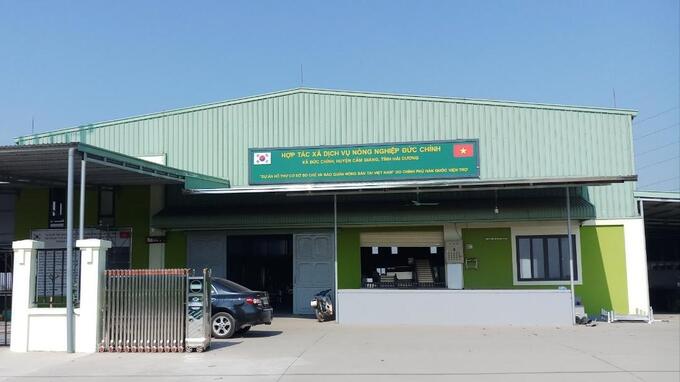
The carrot processing workshop of Duc Chinh Cooperative is funded by the New Village Movement (Saemaul Undong), Ministry of Agriculture, Food and Rural Affairs of South Korea. Photo: Pham Thi Thu Huong.
According to Thuat's assessment, the cause of this year's drop in the price of carrots is due to China's continuous export of carrots to Vietnam. Workers in the southern industrial zones are unemployed, so the amount of cabbage and carrots consumed in these areas has decreased. In addition, adverse weather at the beginning of the crop caused the carrots to become ugly and pointy, have large core and bad shape.
Another obstacle is that South Korea has suspended the import of root crops and tubers (the edible part lying on the ground) from October 3, 2022. This is the second time South Korea has issued this order. The reason is that they spotted the nematode Radopholus similis in banana tubers (the true stem of bananas) exported to Korea. On the other hand, South Korea is the market that consumes 80% of large-sized carrots, so the export of Duc Chinh carrots to this market has recently been halted.
What Thuat looks forward to the most is the reopening of the South Korean market for carrot products. More than 20 South Korean companies are waiting to import carrots from Duc Chinh. It is known that the Sub-Department of Cultivation and Plant Protection Hai Duong has reported this matter to the Plant Protection Department and the Department has had a dialogue with the Korean side to lift the ban.
Regarding the recent suspension of imports of carrots and a number of Vietnamese agro-products into South Korea, the Plant Protection Department stated: Following the direction of the leaders of the Ministry of Agriculture and Rural Development, the Plant Protection Department has urgently negotiated and provided relevant technical documents. South Korea has officially announced the lifting of the ban from December 21, 2022 with the condition that the Plant Protection Department closely inspects to ensure that shipments exported to South Korea are not infected with Radopholus similis nematode.
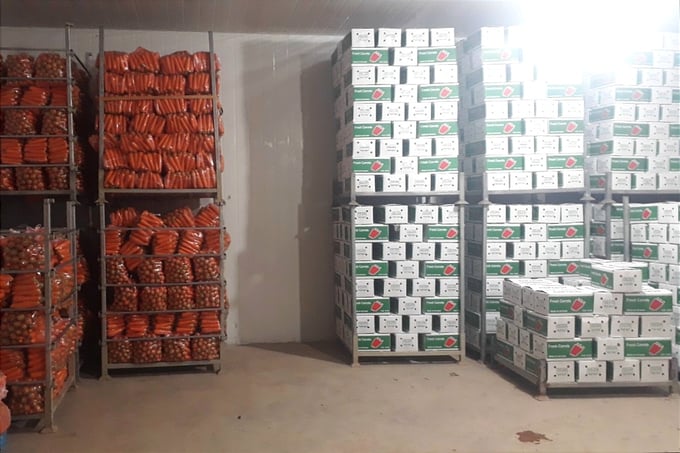
Duc Chinh Cooperative’s carrots in cold storage before being shipped to the domestic and export markets. Photo: Nguyen Duc Thuat.
I asked Thuat, "Are you and the people satisfied with what the Project to support preliminary processing and preservation of agricultural products in Vietnam brings?" It is a project funded by Saemaul Undong, the Ministry of Agriculture, Food and Rural Affairs of South Korea. Vietnam Academy of Agricultural Sciences was the unit that received and implemented the project.
Thuat quickly replied. "More than satisfied, that’s for sure. With a preliminary processing capacity of 100 tons of carrots a day, 3,000 tons per month in 5 months of harvesting carrots every year, 15,000 tons of carrots are exported from the preliminary processing facility funded by the project. After harvest, carrots must be washed through water 5 times, refrigerated - 3 degree Celsius for 16-24 hours until the core reaches 8 degrees Celsius. But that is the tangible value. The intangible value the project brings is much greater than that. Since the project started, many South Korean companies have come here directly to buy carrots. We negotiate the price with them directly, unlike before when they buy through middlemen and the people suffered a forced price. Now companies directly contact us via Zalo. Here, let me show you…”
Thuat took out his phone to show me the message. I also felt happy when a company messaged Thuat that carrots were allowed to be exported to South Korea and they wanted to buy them in January 2023. With a face full of excitement, Thuat said, "More than 20 South Korean companies want to buy Duc Chinh carrots. Samsung Group has already bought Duc Chinh carrots since 2021. The Deputy General Director of Samsung is going to visit the cooperative soon".
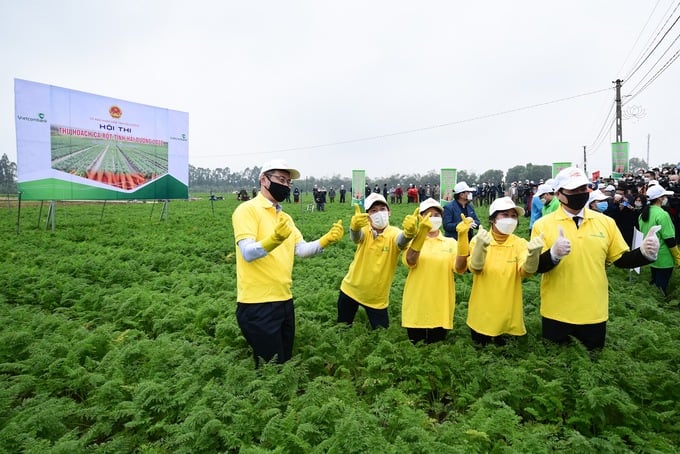
Many guests attended the Hai Duong Carrot Harvesting Contest 2022. Photo: Tung Dinh.
It can be said that this project also promotes other projects to support the concentrated carrot production area in Duc Chinh commune. Hai Duong People's Committee has also invested in expanding the main road of the carrot field in Duc Chinh commune from 3m to 6m to facilitate transportation, and invested in an economical watering system (spraying irrigation) for 100 ha of carrots outside the dyke using the water source from Thai Binh river.
Regarding product safety, in order to export carrots, farmers are obligated to comply with regulations so that the product meets the buyer's requirements. In 2020, a company exporting carrots to Japan had their product returned due to excess Hexaconazole residues. People treated dried rotten tubers with active ingredient Hexaconazole and watered the beds too much. Hai Duong Plant Protection Department had to train farmers to only spray on the leaves, not to water the ground when dealing with plant diseases (watering the drug solution into the soil is not only about the residues in the product but also about killing beneficial microorganisms in the soil).
Hai Duong Plant Protection Department also guided the isolation period of 25-30 days. Starting from that period, carrots could only be exported when the quarantine period was at least 25 days and there was no longer issues residue. With 360 ha of carrots in the whole commune in 2019, increasing to 380 ha in 2021, plus approximately 1,000 ha of land the commune people rent outside to grow carrots each year, the average carrot yield of Duc Chinh commune is now 51 tons/ha. The revenue of carrots, from VND 170 billion in 2019, has gone to VND 300 billion in 2022 (which is actually the revenue of carrots grown from the winter 2021 crop).
We congratulated Thuat and the Duc Chinh carrot farmers. Compared to 2019, the cooperative at present has more faith in the future of carrots. Back then, when I asked about the difficulties in producing and consuming carrots, Thuat said: "The people of Duc Chinh can produce carrots exactly as the market requires, but the market is unstable. We had good crops, but bad prices". But it's different now. Thuat believed that with the current expansion of the market and the trust of consumers in the product, farmers would be able to fetch a good price.
Carrot prices in Hai Duong inched up after South Korea lifted the ban. Duc Chinh carrot’s selling price in the field is currently approximately VND 8,500 /kg, VND 500 /kg higher than last week. According to Duc Chinh Agricultural Service Cooperative (Cam Giang), up to December 27, 9 Korean enterprises have come to survey and sign underwriting contracts for carrots in the 2022-2023winter-spring crop.
In order to promote the export of agro-products, especially carrots, to South Korea, the Plant Protection Department requires the Plant Quarantine Sub-Departments to immediately perform the following tasks:
1. Strictly inspect the origin and harmful organism status of export shipments, especially fresh tubers, to ensure that they meet the phytosanitary regulations of South Korea.
2. The phytosanitary certificate for export should clearly state that the agro-product originated in Vietnam and has the additional declaration: “This shipment (including growing media for plants for planting) was inspected and found free of Radopholus similis".
3. In case of exporting plants with removed growing media, in addition to meeting the above requirements, the phytosanitary agency must check and confirm that the growing media used in the sowing process is not contaminated with R.similis.
4. Do not issue phytosanitary certificates for export to South Korea for plants of genera Anthurium, Philodendron, Monstera and Anubias until there is a notice from the Department on the conditions for exporting these plants to South Korea.
5. Heads of units should provide directives and thoroughly relay to all plant quarantine officers in their units, notify and guide exporting enterprises to strictly implement the above-mentioned contents. In the course of implementation, if there are any difficulties, please report immediately to the Department for timely settlement.
Translated by Samuel Pham

(VAN) Deputy Minister Nguyen Quoc Tri also expressed his hope that Cuba will soon overcome its current challenges, attain food security, and further expand cooperation with Vietnam.

(VAN) The project contributes to enhancing the resilience of communities vulnerable to the impacts of climate change, with a primary focus on local women.
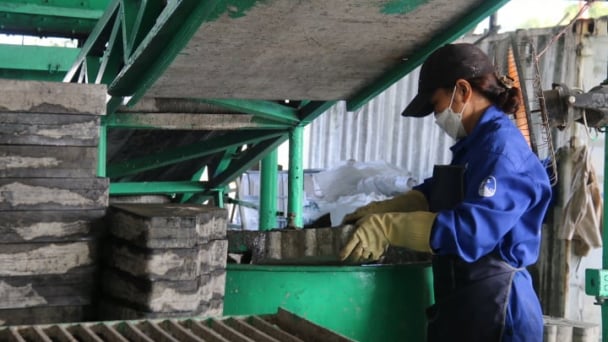
(VAN) Green materials help save energy and resources. However, after more than 10 years, Vietnam has only developed over 200 green buildings with more than 6 million square meters of floor space.

(VAN) Vietnam - Thailand Business Forum 2025: One plus one on three connects, marking a milestone in the comprehensive strategic partnership between the two nations.
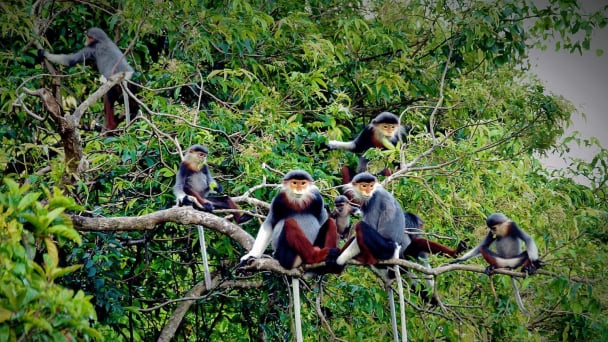
(VAN) The United Nations designated 22 May as the International Day for Biodiversity 2025 with the theme 'Harmony with nature and sustainable development.'
![Multi-channel, multi-directional Vietnamese agricultural markets: [8] A national strategy is needed](https://t.ex-cdn.com/nongnghiepmoitruong.vn/608w/files/phucpm/2025/05/15/1435-thi-truong-nong-san-viet-da-kenh-da-huongbai-8-can-mot-chien-luoc-quoc-gia-084750_728.jpg)
(VAN) The Chairman of Hung Nhon Group shared: ‘Opening up and tapping into new markets is the right and strategic direction for Vietnam's agricultural sector.’
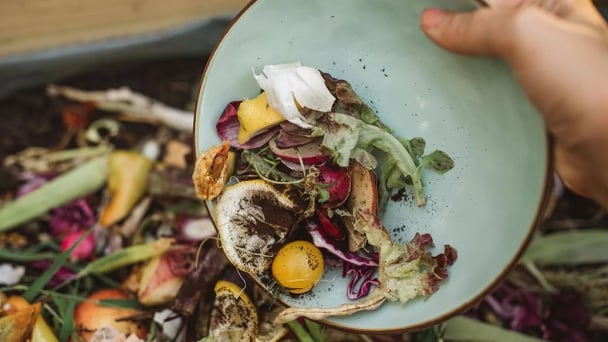
(VAN) Food waste has become a serious issue in modern society, especially in rapidly urbanizing and developing cities like Hanoi.